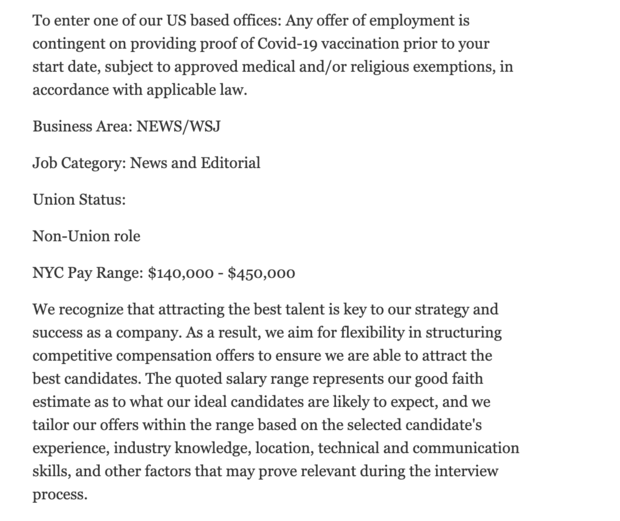NYC companies post overly broad salary ranges to avoid pay transparency
Many firms seeking to hire employees in New York City have begun to comply with new rules that require companies to post a salary range for every job listing — a measure aimed at promoting pay equity. But other companies appear keen on circumventing the new law, which went into effect Monday, by posting overly broad salary ranges.
Indeed, some employers are posting jobs with pay ranges whose lows and highs span $100,000 or more. Technically, they could be in compliance with the pay transparency's requirement that companies post a "good faith" estimate as to how much the position will pay. But it doesn't give job seekers — or current employees, for that matter — much information.
"Some companies are posting such a wide salary range it's basically uninformative. Like, 'This role pays between $30,000 and $140,000,'" said Julia Pollak, chief economist at ZipRecruiter, an employment marketplace.
For example, international consulting firm Deloitte posted a salary range of $86,800 to $161,200 for a senior tax accountant requiring at least two years' relevant experience.
Deloitte explained in the listing that compensation for the role will be determined by "skill sets; experience and training; licensure and certifications; and other business and organizational needs." The firm also includes a disclaimer that it's unusual for hires workers to land salaries close to the top of the role's range.
Similarly, a posting for an executive producer role at the Wall Street Journal advertises a pay range of $50,000 to $180,000 for New York City applicants. Another opening at the newspaper, for "Head of News Audio," lists a salary range of $140,00 to $450,000.
"It's probably putting those companies at a disadvantage for having too broad of a range," said Tauseef Rahman, a partner at asset management firm Mercer's Career Practice. "The downside is the low might be too low and people might find that range to be unattractive. And if a candidate is not at the high end of the range, they could find themselves unclear or upset as to why they're not toward the higher end."
Companies that don't wish to disclose pay practices can also skirt the rule by using outside search firms or hiring workers through word of mouth, as the law only applies to job advertisements, whether they are posted on a firm's own website, an external job board or elsewhere.
"The notion is that this is supposed to be correcting inequalities and discrimination that have occurred based on race and gender in hiring," said Helen Rella, an employment attorney at New York-based firm Wilk Auslander. "The precept is employers are offering a lesser salary to women or minorities or other people who fall within protected classes. The notion that by requiring that the salary range is listed is going to protect against that remains to be seen."
The new law could also spur another, positive trend: Some companies have begun posting salary ranges for all jobs across the U.S., regardless of whether they are required to do so by law.
"We are starting to see companies not only abide by the law, but also extending it to places that don't have mandates right now," said Vicki Salemi, a career expert for job search site Monster.
— With reporting from Irina Ivanova






